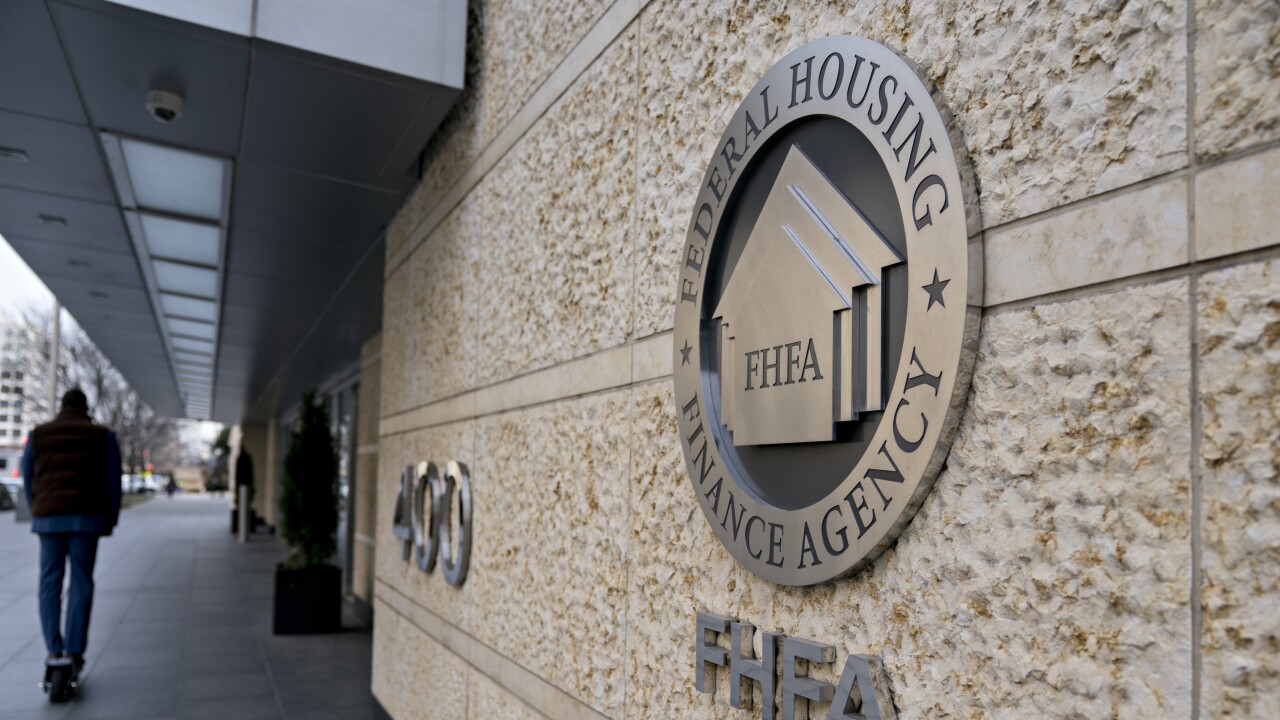-
Competition is starting to ease in the $812 billion private credit market as the disruption caused by the coronavirus pandemic forces some lenders to tend to problems in their own portfolios.
April 27 -
Correspondent loan sellers are hoping the new GSE purchases will help to open a market frozen by coronavirus-related risk — but the prices offered so far aren't too promising.
April 24 -
A quarterly survey shows a major cross-section of portfolio managers it may be more than a year before global credit conditions return to normalcy from the economic havoc unleashed by the COVID-19 pandemic.
April 16 -
Declines in mortgage servicing rights valuations at JPMorgan Chase and Wells Fargo point to the resurgence of a dilemma that came up during the last downturn.
April 15 -
Lenders that split their sales of loans and servicing between two different investors may be facing yet another challenge due to the coronavirus outbreak.
April 13 -
Ginnie Mae will begin taking requests for assistance from issuers who, having exhausted all other options, are having trouble advancing borrowers' principal-and-interest payments to investors amid the pandemic.
April 11 -
The agencies will give the industry another month to submit feedback on the so-called covered fund portion of the rule "in light of potential disruptions resulting from the coronavirus.”
April 2 -
Mortgage bankers are sounding alarms that the Federal Reserve's emergency purchases of bonds tied to home loans are unintentionally putting their industry at risk by triggering a flood of margin calls on hedges lenders have entered into to protect themselves from losses.
March 30 -
Two Harbors, a real estate investment trust, sold the bulk of its nonagency mortgage-backed securities portfolio to head off margin calls and refocus on its more favorable agency-MBS investments.
March 26 -
The ratings agency on Wednesday placed whole-business securitizations from Applebee's/IHOP, TGI Friday's and Planet Fitness under review for potential downgrades.
March 25 -
The Federal Housing Finance Agency authorized the government-sponsored enterprises to lend additional support to the mortgage-backed securities market and temporarily allow some flexibility in lending requirements to address coronavirus-related concerns.
March 23 -
Additional mortgage-backed securities purchases by the Federal Reserve Bank of New York will address private investor skittishness about the asset class, but it will not necessarily lower rates.
March 20 -
A large percentage of Institutional investors lack confidence in the U.S. government’s ability to contain and eradicate the coronavirus outbreak. But few have plans to pull capital out of specific geographic regions due to the pandemic.
March 17 -
Not so long after Treasury bond yields experienced an unprecedented drop, the average 30-year mortgage rate rose, reflecting volatility related to the coronavirus as well as capacity issues on multiple levels.
March 12 -
Over the last two weeks, at least half a dozen lenders to mid-size businesses actively fundraising in North America and Europe have canceled appointments or travel plans to meet with prospective investors due to the continuing spread of the coronavirus.
March 11 -
Terry Wakefield, a technology consultant who helped launch Fannie Mae's mortgage-backed securities business and form Prudential Home Mortgage, has died. He was 70.
March 11 -
Mortgage companies that borrow heavily to keep their operations running may face financial pressure from coronavirus-related market volatility as it affects the valuations of collateral securing their financing.
March 9 -
Though the agency plans to give more credit unions authority to issue subordinated debt, limited investor appetite and other factors could hamper activity.
February 25 -
In another rollback of the bank trading ban, the federal agencies unveiled a plan to allow financial institutions to invest in multiple companies through certain fund structures.
January 30 -
Regulators already finalized a rollback of the proprietary trading ban section of the rule but signaled then that their overhaul was not finished.
January 23


















